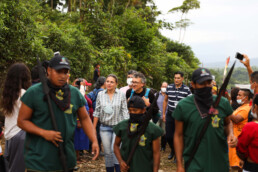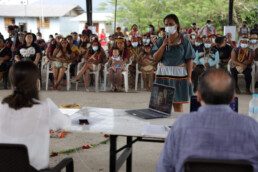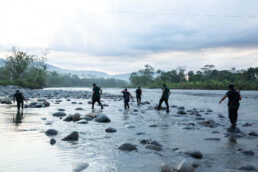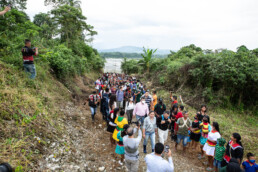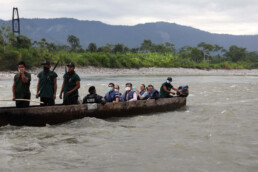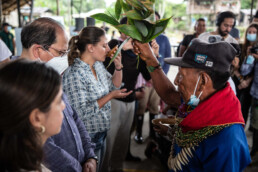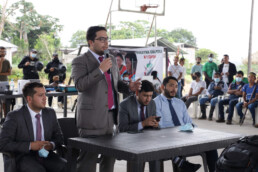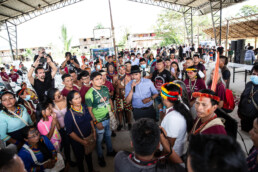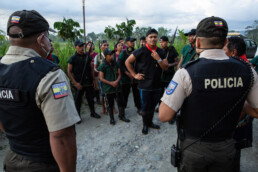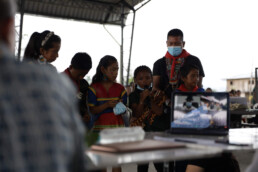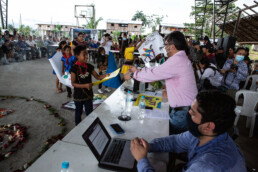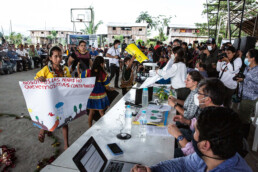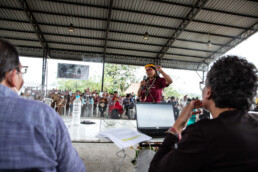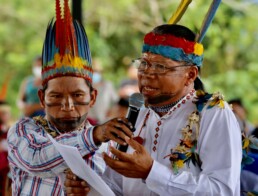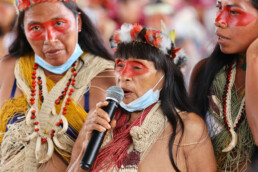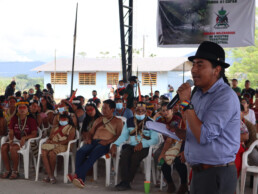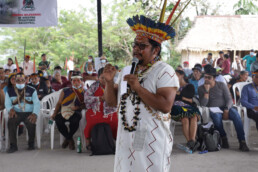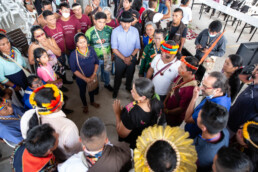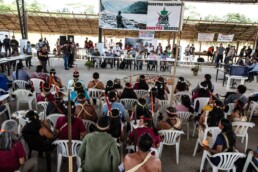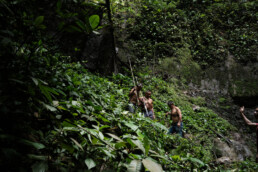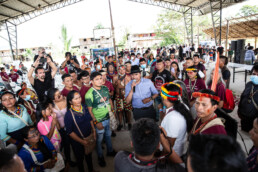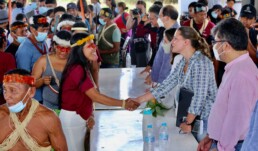On November 15th 2021, just days after the COP26 climate conference ended, Ecuador’s Indigenous movement hosted judges from the country’s highest court for a historic hearing deep in Indigenous Amazonian territory, a first in Ecuadorian history. Indigenous leaders from across the nation, as well as government officials (opponents in the original case), presented oral arguments as the Court looks to set national precedent on perhaps the two most important rights for Indigenous guardianship of our planet’s largest rainforest.
As detailed in a communication published yesterday by Ecuador’s Indigenous Movement, the case concerns first, “the right for Indigenous peoples in Ecuador to decide what happens in our territories, that is to say our essential right to self-determination and Free, Prior and Informed Consent, recognized internationally but not yet recognized, respected or applied in Ecuador.” And second, “the Rights of Nature, that is to say, the right of rivers, forests, mountains, and animals to exist without threats, contamination or destruction.” With 70% of the Ecuadorian Amazon in Indigenous hands and a new conservative ex-banker President promising to double oil production and rapidly expand mining in the Amazon, this ruling could be a game-changer.
The high-stakes hearing took place in the A’i Kofan community of Sinangoe, whose 2018 lower-court victory canceled 52 gold-mining concessions along one of the country’s most important Amazonian headwaters. The A’i Kofán, a legendary Indigenous group known for their healing powers, river navigation skills, and stewardship of one of the most bio-diverse ecosystems in Ecuador, hosted hundreds of Indigenous leaders, elders and youth from across the country with a clear message: “Our territory is the base of our very existence and as ancestral peoples we have the right to decide over our future and our territories.”
Their territory is 63,775 hectares of primary forest, where jaguars, spectacled bears, and tapirs live. “Our spirits and the ‘invisible people’ live there too, it is where our identity as a People resides and only there is it possible to live, think and be A’i Kofán.”
Five of the nine judges of the Court crossed the Aguarico River and participated in a traditional harmonization ceremony before connecting to satellite internet and initiating the official hearing. From the Ecuadorian state, the Ministry of Energy and Mining was present in Sinangoe to defend the extraction of metals and petroleum in Indigenous territories to promote “the wealth and progress of everyone.” Other Ministries, like the Ministry of the Environment, Water and Ecological Transition, participated in the hearing online.
Children from the community handed in drawings and hand-written letters to the judges as evidence.
Tayra Narvaez, a 12 year-old A’i Kofán girl, told the judges, “I want you to listen to us because as children this territory gives us everything and we are happy. We need you to take care of our territory, so we can live without mining and without contamination.”
Nemonte Nenquimo, who represents the Waorani of Pastaza and whose historic court case will also be heard by the Supreme Court shortly, said to the judges:
“You have a great opportunity as judges. We want our right to say yes or no to extractive projects to be respected. What has happened up until now has only led to deceit, division and destruction. As women, we demand that our rights are respected. We will be at the frontlines of this fight because we know that a great threat to our territories is on the horizon.”
Nemonte Nenquimo, who represents the Waorani of Pastaza and whose historic court case will also be heard by the Supreme Court shortly, said to the judges:
“You have a great opportunity as judges. We want our right to say yes or no to extractive projects to be respected. What has happened up until now has only led to deceit, division and destruction. As women, we demand that our rights are respected. We will be at the frontlines of this fight because we know that a great threat to our territories is on the horizon.”
Jose Gualinga, ex-President of the Kichwa of Sarayaku explained to the judges that:
“mining in our sacred territories is like mining in the ancient ruins of Rome or the Notre Dame in Paris.”
Jose Gualinga, ex-President of the Kichwa of Sarayaku explained to the judges that:
“mining in our sacred territories is like mining in the ancient ruins of Rome or the Notre Dame in Paris.”
Wiña Omaka, a Waorani elder, was joined by other women as she sang to the judges:
“Our land is everything. For us and for you. There we have everything. Fish, animals, medicine. You eat from the market in the city, we eat from the forest.”
She added:
“When we say ‘no’ that means no. I am the authority of my territory, as you are the authorities in the city.”
Wiña Omaka, a Waorani elder, was joined by other women as she sang to the judges:
“Our land is everything. For us and for you. There we have everything. Fish, animals, medicine. You eat from the market in the city, we eat from the forest.”
She added:
“When we say ‘no’ that means no. I am the authority of my territory, as you are the authorities in the city.”
Leonidas Iza, President of the national Indigenous federation CONAIE, stressed the need to guarantee the right to free, prior and informed consent in order for Indigenous peoples to exercise self-determination and other fundamental rights guaranteed in the Constitution.
Leonidas Iza, President of the national Indigenous federation CONAIE, stressed the need to guarantee the right to free, prior and informed consent in order for Indigenous peoples to exercise self-determination and other fundamental rights guaranteed in the Constitution.
Justino Piaguaje said:
“My Nation, the Siekopai, have only 600 people left here in Ecuador. We want to continue to exist, and not fall into extinction like so many other Indigenous cultures in history.
We must have the right to decide our future and we must guarantee the Rights of Nature. Because it’s not just my people that face extinction: the world is facing profound climate change, and a point-of-no-return.”
Justino Piaguaje said:
“My Nation, the Siekopai, have only 600 people left here in Ecuador. We want to continue to exist, and not fall into extinction like so many other Indigenous cultures in history.
We must have the right to decide our future and we must guarantee the Rights of Nature. Because it’s not just my people that face extinction: the world is facing profound climate change, and a point-of-no-return.”
Ecuador became the first country to enshrine the Rights of Nature into its Constitution in 2008, giving citizens the possibility to sue on behalf of trees, rivers or animals. This case presents an opportunity for the Constitutional Court to recognize, among other things, how the rights of a fragile river ecosystem trump government plans for mining or oil that could destroy that river.
As Sinangoe and Ecuador’s Indigenous Movement’s published statement yesterday says, “The resolution of this case by the Constitutional Court is urgent and extremely important for the moment that Ecuador, and the planet, currently finds itself in.
The hearing took place days after world leaders signed agreements to face climate change and stop deforestation at COP26 in Glasgow, and months after the President of Ecuador Guillermo Lasso promised to double oil extraction and rapidly expand mining in the Amazon, through Presidential Decrees 95 and 151 (which was recently challenged by Indigenous peoples in Court).”
Indigenous peoples take care of 70% of the Ecuadorian Amazon, almost 7 million hectares of the most important rainforest on the planet. Deforestation of just one hectare of our territories represents the equivalent carbon emissions of 160 cars for a whole year.
It is not possible to face climate change without the Amazon, and it is not possible to protect the Amazon without us, Indigenous peoples, and without guaranteeing our rights
The Court should publish a ruling within the next few months that will set national precedent. The ruling will also set obligatory precedent for Ecuador’s Congress which must elaborate a law that regulates the right to free, prior and informed consent nationally.
The judges of the Constitutional Court have the heavy responsibility to make a decision regarding our rights. This is about life and death, about our future or our extinction.
The Court should publish a ruling within the next few months that will set national precedent. The ruling will also set obligatory precedent for Ecuador’s Congress which must elaborate a law that regulates the right to free, prior and informed consent nationally.
The judges of the Constitutional Court have the heavy responsibility to make a decision regarding our rights. This is about life and death, about our future or our extinction.
